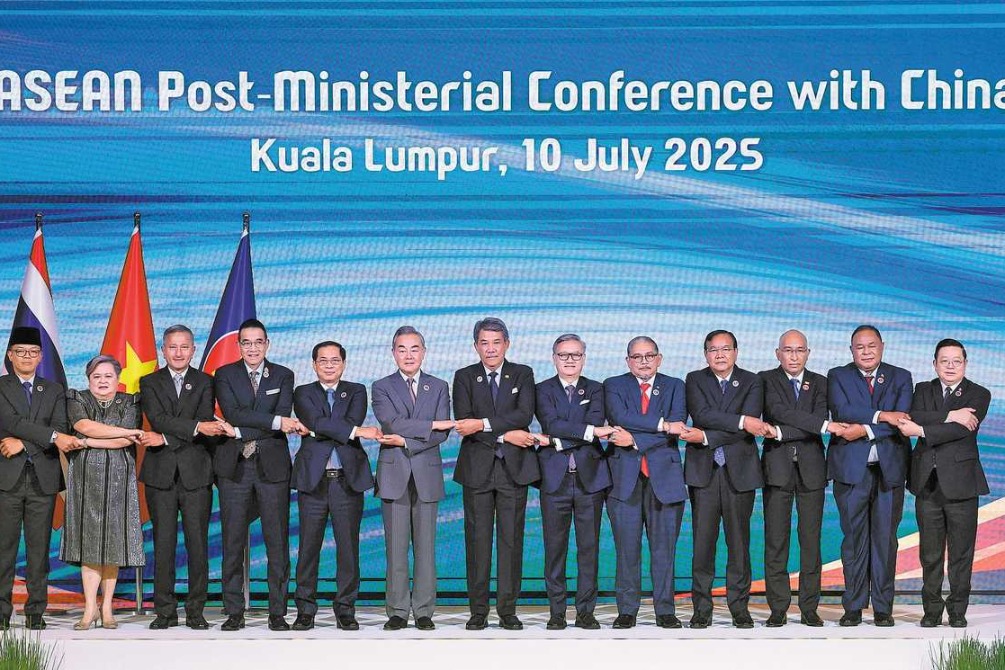Trump's tariff argument keeps Americans in dark

US President Donald Trump has been blaming trading partners for ripping off the United States in trade. He has been using controversial trade remedies to impose tariffs on imports in the name of helping American people and workers.
These include his imposing hefty tariffs on imported washing machines and solar panels announced in January, new tariffs on steel and aluminum imports he signed this month and potentially new tariffs on Chinese technology and communications goods and more restrictions on Chinese foreign direct investment in the US.
These measures have greatly raised concerns for a trade war between the US and China and many other countries. Unlike what Trump has claimed, they could very well end up as his war on American consumers and jobs.
The rationale for this is self-evident, just using China as an example. A report by the Oxford Economics and the US-China Business Council in early 2017 showed that the China-US trade relationship supports 2.6 million jobs across a range of industries, including jobs that Chinese companies have created in the US.
The report also showed that nations trading closely with China outperform nations with less integrated trade ties.
While supporting US jobs, Chinese manufacturers lowered prices for US consumers, dampened inflation and put more money in American wallets. While a typical US household earned about $56,500 in 2015, trade with China saved these families up to $850 that year, according to the report.
The Trump White House clearly doesn't want the American people to know this.
An article by economist Pierre Lemieux published last week on the Cato Institute website shows that Trump's tariffs on washing machines are nothing but imposing a tax on 97 million US households in the name of protecting 2,400 workers in washing machine factories.
Meanwhile, the tariffs on imported solar modules and cells are threatening 258,000 workers in the installation sector in the name of protecting 2,000 workers in the manufacturing sector.
In 2007, the book Year without Made in China by Sara Bongiorni caught much public attention. The story might be less true today because a lot of labor intensive jobs have been relocated from China to countries such as Vietnam, India and Bangladesh over the past decade with rising labor costs in China.
Still it would be hard to imagine how Americans shopping at Walmart, Target and Costco would be negatively affected if China, Vietnam and other developing countries no longer supply those cheap products. This is also true for other advanced economies.
The Economic Benefits of US Trade, a 2015 report by a different White House, shows that compared to a world with no trade, median-income consumers in the US gain an estimated 29 percent of their purchasing power from trade.
Trump, however, has constantly painted US as a victim in global trade. He never talks about how most US manufacturing jobs are decimated by automation, rather than trade, and he never talks about how the US government, unlike many other governments, has done a poor job of helping workers negatively impacted by trade agreements.
Trump has also mistakenly equated US trade deficits to a loss for the US and a win for its trade partners, despite the fact that almost all economists and trade experts disagree with such a notion.
Besides, the large trade deficit with China, $375 billion in 2017 according to US data and $275 billion according to Chinese data, is misleading.
China's exports to the US, such as iPhones, contain a large percentage of components made by other countries, from the US to Japan to Europe, as China has become the final assembly line of global manufacturing supply chain.
If the value of these imported components is subtracted from China's exports, the US trade deficit with China is reduced by half, about the same as the US trade deficit with the European Union, according to the Oxford Economics report.
Robert Lawrence, a senior fellow at the Peterson Institute for International Economics and a professor of trade and investment at Harvard University, wrote a detailed analysis this month about why Trump's focus on trade deficits is misleading.
Republican Senator Ben Sasse from Nebraska, in a talk at the Heritage Foundation on Friday, also criticized Trump's misleading of the American public with trade deficits.
It is hard to believe that Trump could continue to fool Americans with his flawed argument on tariffs and trade deficits.
Contact the writer at chenweihua@chinadailyusa.com.































